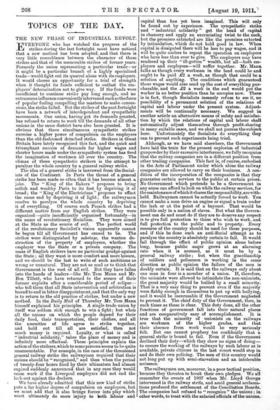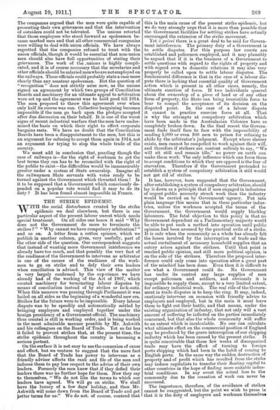TOPICS OF THE DAY.
THE NEW PHASE OF INDUSTRIAL RE VOLT.
'EVERYONE who has watched the progress of the strikes during the last fortnight must have noticed that a new method has been adopted, and that there is very little resemblance between the character of these strikes and that of the memorable strikes of former years. Formerly the union representing a particular trade—or it might be a particular branch of a highly specialized trade—would fight out its quarrel alone with its employers. It would choose an opportunity for a trial of strength when it thought its funds sufficient to outlast the em- ployers' determination not to give way. If the funds were insufficient to continue strike pay long enough, and no extraneous influence conveniently intervened such as the force of popular feeling compelling the masters to make conces- sions, the strike failed. But the strikes of the past fortnight have been a network of interdependent and sympathetic movements. One union, having got its demands granted, has refused to return to work till the demands of all other unions in the same district have also been granted. It is obvious that these simultaneous sympathetic strikes exercise a higher power of compulsion on the employers than the old-fashioned detached strike. Strikers in Great Britain have lately recognized this fact, and the quick and triumphant success of demands for higher wages and shorter hours made under the sympathetic system has fired the imagination of workmen all over the country. The climax of these sympathetic strikers is the attempt to paralyze the whole country by a eeneral railway strike. The idea of a general strike is 'borrowed from the Social- ists of the Continent. In Paris the threat of a general strike has been made so often that it has become almost a. joke. The " King of the Bakers " proposes to bring selfish and wealthy Paris to its feet by depriving it of bread ; the " King of the Electricians " proposes to effect the same end by depriving it of light; the railwaymen resolve to paralyze the whole country by depriving it of everything Of course such French strikes had a different motive from our English strikes. They were organized—quite insufficiently organized fortunately—in the name of revolutionary Socialism. They were aimed at the State as the source of evil. The perfect world of the revolutionary Socialist's vision apparently cannot be begun till all Government has ceased to be. The strikes were distinguished by sabotage, the wanton de- struction of the property of employers, whether the employer was the State or a private company. The mass of English strikers have no particular grudge against the State ; all they want is more comfort and more leisure, and we should be the last to write of such ambitions as wrong or unnatural. They are not so mad as to think that Government is the root of all evil. But they have fallen into the hands of leaders—like Mr. Tom Mann and Mr. Ben Tillett, who have returned to the scenes of their former exploits after a considerable period of eclipse— who tell them that all State intervention and arbitration is bound to end in bitter disappointment, and that the only way is to return to the old practice of strikes, but under a new method. In the Daily Mail of Thursday Mr. Tom Mann himself explained his principles. A single trade union by itself was seldom rich enough to win a fight; but when all the unions on which the people depend for their daily food, their transportation, their clothes, and all the amenities of life agree to strike together, and hold out till all are satisfied, then not much money is required. Loyalty, or what is called " industrial solidarity," takes the place of money and is infinitely more effectual. These .principles explain the action of the strikers, which to some persons seems to be quite unaccountable. For example, in the case of the threatened general railway strike the railwaymen required that their unions should be " recognized," and then when the period of twenty-four hours fixed by their ultimatum had almost expired suddenly announced that in any case they would cease work if the Liverpool employers did not end the lock-out against the dockers. • We have already admitted that this new kind of strike puts a far higher degree of compulsion on employers, but we must add that it also brings forces into play which must ultimately do more injury to both labour and capital than has yet been imagined. This will only be found out by experience. The sympathetic strike and " industrial solidarity " get the head of capital in chancery and apply an excruciating twist to the neck, but the promises extracted are like the promises extorted by intimidation, which do not hold good. in law. When capital is dissipated there will be less to pay wages, and it will be quite useless to repeat the operation on employers who have less than ever to give. The employers may have rendered up their " ill-gotten " wealth, but all—both em- ployers and employees—will suffer together. Mr. Mann talks as though every workman in the land could be and ought to be paid £2 a week, as though that could be a solution of anything. The conditions which guaranteed those wages would also send up the cost of everything pur- chasable, and the £2 a week in the end would put the worker in no better position than he occupies now. There is in fact, though Socialists insanely refuse to see it, no possibility of a permanent solution of the relations of capital and labour under the present system. Adjust- ments will be continually necessary. We suggest in another article an alternative means of safety and satisfac- tion by which the relations of capital and labour shall automatically adjust themselves through profit-sharing in many suitable eases, and we shall not pursue the subject here. Unfortunately the Socialists do everything they can to prevent such experiments being tried.
Although, as we have said elsewhere, the Government have laid. the train for the present explosion of industrial gunpowder by their excessive interference, we fully recognize that the railway companies are in a different position from other trading companies. This fact is, of course, embodied in the Acts of Parliament under which alone the railway companies are allowed to carry on their business. A con- dition of the incorporation of the companies is that they guarantee certain services to the public at certain prices. No Government which pretends to be a Government in any sense can afford to look on while the railway services, for themaintenance of which it shares the responsibility, are with- held. Railwaymen cannot be actually forced to work. You cannot make a man drive an engine or signal a train under the lash or at the point of a bayonet. That would be possible only in a nation of slaves. But what the Govern- ment can do and must do if they are to deserve any respect is to give full protection to those who wish to work, and full protection to the public and to property. Every resource of the country should be used for these purposes, and if this be done such an anti-Social attempt as to paralyze the country is absolutely certain to fail. It would fail through the effect of public opinion alone before long, because public anger grows at an alarming rate when it is aroused, as it must be by a. general railway strike ; but when the guardianship of soldiers and policemen- is working in the same direction as public opinion the failure of the men is doubly certain. It is said that on the railways only about one man in four is a member of a union. If, therefore, the unionists were allowed to intimidate the non-unionists, the great majority would be bullied by a small minority. That is a very easy thing to prevent even if the majority were flabby enough in themselves to put up with bullying, and it would be inexcusable if the Government neglested to prevent it. The chief duty of the Government, then, in such times as these is clear. This duty done, all the other functions of government fall into their natural places and are comparatively easy of accomplishment. It is true that the minority of unionists on the railways are workmen of the higher grades, and that their absence from work would be very seriously felt. But one cannot prophesy too confidently that a general strike is bound to fail. Even if the Government declined their duty—which they show no signs of doing—. to ensure the working of the railways by such labour as is available, private citizens in the last resort would step in and do their own policing. The men of this country would not long put up with semi-starvation and an intolerable nuisance.
The railwaymen are, moreover, in a poor tactical position, because they threaten to break their own pledges. We all remember the events of 1907 when Mr. Lloyd George intervened in the railway strife, and amid general acclama- tions produced the settlement of the Conciliation Boards. The companies had refused to " recognize " the unions ; in other words, to treat with the salaried officials of the unions. The companies argued that the men were quite capable of presenting their own grievances and that the intervention of outsiders could not be tolerated. The unions retorted. that those employees who stood forward as spokesmen be- came marked men and that all other commercial companies were willing to deal with union officials. We have always regretted that the companies refused to treat with the union officials, though it would. be essential that non-union men should also have full opportunities of stating their grievances. The work of the .unions is highly compli- cated, and it is of course necessary that the secretaries and other officials should be salaried menwho are not employed on the railways. These officials could probably state a case more clearly than any amateur spokesman. But the question of " recognition " does not strictly arise now, as the unions signed an agreement by which two groups of Conciliation Boards and machinery for an ultimate appeal to arbitration were set up and the agreement was to hold good till 1914. The men proposed to throw this agreement over when only half its course was run. Collective bargaining becomes impossible if the men go back upon. the pledges accepted after due discussion on their behalf. It is one of the worst signs of recent industrial warfare that the men have under- mined the basis on which their right to effect corporate bargains rests. We have no doubt that the Conciliation Boards have been a disappointment to the men, but this is an argument for refusing to accept them again in 1914, not an argument for trying to stop the whole trade of the country.
We must add in conclusion that, puzzling though the case of railways is—for the right of workmen to get the best terms they can has to be reconciled with the right of the public to exist—the difficulties would be immeasurably greater under a system of State ownership. Imagine all the railwaymen State servants with votes ready to be turned against the Government which thwarted. them ! Is it to be supposed that a Government which consciously de- pended on a popular vote would find. it easy to do its duty ? It has been found almost impossible in France.



































 Previous page
Previous page